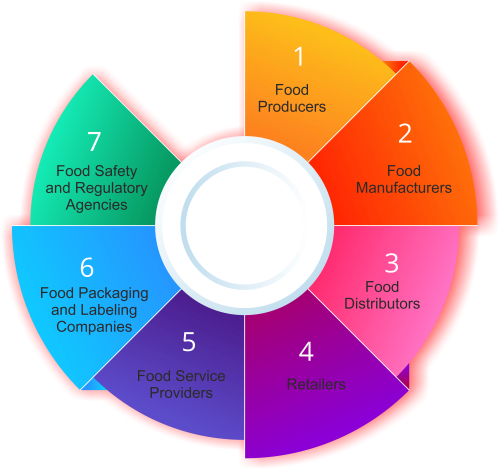The food industry can impact customers’ health in various ways. Firstly, it plays a significant role in determining the nutritional content of available food that directly affects consumer health through ingredients and nutritional quality. Poor food safety practices can lead to foodborne illnesses, while rigorous standards can protect consumers. Additionally, the industry’s marketing and advertising practices influence consumer choices and can contribute to poor dietary habits.
Accessibility of healthy options and transparency in labelling and nutrition information significantly impact consumer health. The food industry must prioritize consumer health by promoting nutritious options and upholding rigorous food safety standards. Moreover, it must ensure transparent and responsible practices while supporting consumer education and public health initiatives to improve overall health outcomes.
The food industry is vast and diverse, including various other organizations involved in food production, processing, distribution, and retail. Here are some key types of organizations that are part of the food industry:

The International Organization for Standardization (ISO) has published over 22000 ISO standards to help organizations across various sectors improve their business management systems and overall performance.
ISO certification, precisely ISO 22000:2018 Certification, ensures food safety by standardizing processes. Moreover, the standard mandates every organization involved in the food supply chain to conduct a hazard analysis to implement appropriate control measures. It also helps organizations maintain compliance with legal requirements by encouraging continuous improvement to enhance consumer confidence. ISO 22000 helps food organizations align with food safety practices across the supply chain and adopt effective risk management and control strategies.
ISO 22000 consultancy provides valuable support to organizations in the food industry seeking to attain ISO certification by offering expert guidance and assistance throughout the certification process. ISO consultancy firms help organizations interpret the requirements of standards such as ISO 22000 to develop and implement robust food safety management systems. Certification bodies also assist organizations in conducting internal audits to identify areas for improvement and prepare for external certification audits. Additionally, they provide training to personnel and offer documentation templates to ensure that the organization is fully prepared to meet the necessary criteria for ISO certification.
ISO Certification Consultancy bodies, like MSCi, (Management System Compliance Incorporation) can help organizations across the entire food supply chain. ISO Consultants help organizations adopt appropriate measures to identify potential food safety hazards and address them appropriately. Moreover, ISO Consultancy bodies make the ISO 22000 Certification journey for organizations more accessible and smoother. Here is a complete list of ISO certifications that apply to every organization involved in the food supply chain, from food manufacturing to distribution.
The food and food products industry plays a pivotal role in shaping consumer health and well-being through its impact on nutritional content. Moreover, organizations must implement appropriate food safety requirements and product marketing practices to promote accessible healthy options for customers.
The industry can significantly contribute to healthy outcomes by prioritizing rigorous food safety standards and transparent labeling practices to demonstrate nutritional information. ISO Certifications are internationally acknowledged standards and the implementation of standards like ISO 22000:2018 ensures that organizations maintain high food safety practices to manage risks effectively and comply with legal requirements.
Ever since its establishment of QMCS in 1991 in Gurgaon, MSCi (Management System Compliance Incorporation) came into existence with broader portfolio focusing on aggressive growth to enter international market. It has become one of the largest & fastest growing business management consulting organization which specializes in business consulting services to organizations of any size or sector
ISO Consultancy Services
33, Guru Nanak complex, New Railway road, Gurgaon-122001, haryana, India
